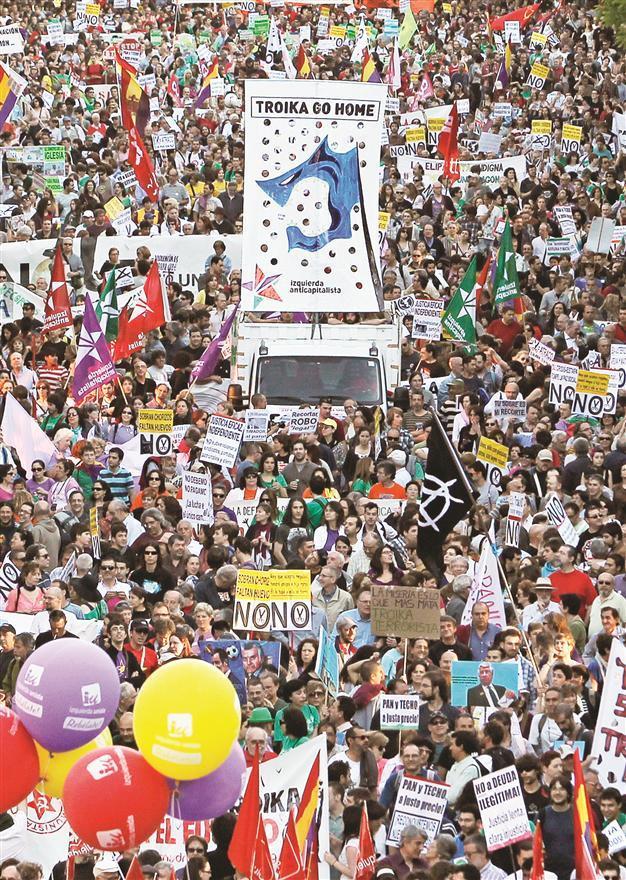Austerity-weary Spain seeks change
MADRID/FRANKFURT - The Associated Press

ProtestErs march holding a banner reading ‘Troika go home’ during a demonstration in Madrid on June 1. Anti-austerity protesters took to the streets of European cities including Madrid and Lisbon to express their anger. AP photo
Spaniards tired of spending cuts and allegations of high-level corruption want new parties to shake up the current political scene, according to an opinion poll published yesterday, right afterAnti-austerity protesters took to the streets of European cities including Madrid and Lisbon to express their anger at government cuts they say are making the financial crisis worse by stifling growth and increasing unemployment.Thousands marched towards Madrid’s central Neptuno fountain, near parliament, chanting “Government, resign,” while around 15,000 gathered outside the International Monetary Fund’s headquarters in Lisbon shouting “IMF, out of here.”
Spain has been in recession for most of the past four years and has a record 27.2 percent unemployment rate. The percentage is twice that high for Spaniards under 25 years old.
Politic disenchantment
In Spain power has switched between the centre-right People’s Party (PP) and the socialist PSOE since 1982. The country was ruled by dictator Francisco Franco for decades until his death in 1975.
Spaniards have become disenchanted with their politicians, especially since the ruling PP was accused of graft. They rank corruption as the country’s second-biggest problem, behind unemployment.
Seventy-nine percent consider the current parties to all be the same and 70 percent want new ones to be formed so they have more options when they vote, the Metroscopia poll found.
Public disillusion has helped smaller parties come to the fore such as the Union for Progress and Democracy (UPyD), led by former Socialist Rosa Diez. Previous polls have indicated if an election were held now, the party could increase its seats in the 350-seat parliament to 30 from five.
Need for ‘occupy’ groups’ engagement
Social movements, such as the “Indignados” (Indignants) who first occupied Madrid’s Sol square two years ago and are credited with sparking similar “Occupy” protests across the world, have gained popular support as traditional politics has failed to create jobs and ease the country’s economic crisis.
The Metroscopia poll published in newspaper El Pais showed 67 percent of Spaniards thought these groups should find a political platform and compete with traditional parties in the next election, to be held in 2015.
Other movements that have become increasingly popular are a group that helps people forcibly evicted from their homes when they fail to pay their mortgages and activists who campaign against cuts in education and healthcare.
The survey of 600 people carried out on May 29 and 30 showed that 19 percent of people believed the majority of parties were interested in public opinion, down from 50 percent in 2007.
















